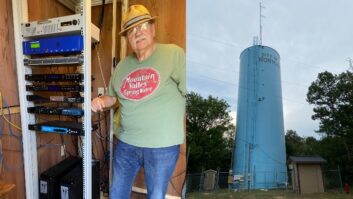It�s quite likely that you are a one-man (or one-woman) band, providing technical support at a radio station (or stations). Many of the recent messages I have received from readers show that a lack of help in the form of a second person is endemic in radio.
iStockphoto/� GuidoVrola In Tech Tips, I�m going to continue to do my best to explain tried-and-true ways to cope with this situation.

While you cannot be in more than one place at a time in the literal sense, you can be in the figurative sense. In order to do so, you must plan for events that may or may not ever happen. Let me give a few examples:
Our transmitter never fails�therefore we don�t have a backup. While this might be true over a short period of time, eventually every transmitter will need some down time.
The power has never failed at the studio�therefore we don�t have a generator. Again, over a several-year period, this might be true. Not to seem like too much of a pessimist, but you can almost bet that when it does fail (because it will), it will be during an inopportune time.
A major problem with being the sole person in engineering is the stress that comes from having to decide which fire to put out first; another is having to drop everything and go off to perform a technical miracle at one site, while another fire is still smoldering.
Planning for emergencies is something that gets easier as you gain more experience. You�ll take on a new station, walk through it and think to yourself: �This is wrong, this is wrong, this is wrong,� while making mental notes of all that needs to be done. As you recall all the emergencies that have come your way, you�ll begin to recognize which ones are just waiting to happen in your new charge.
Here�s the one key takeaway: Always plan your response from the perspective of the emergency responder.
Let me give you an example.
You take on a new job or an additional radio station. You study the studio-to-transmitter link configuration. From the comfort of your desk, in the middle of the week, during normal business hours, you conclude that having a spare STL transmitter sitting on the shelf means that you are covered in the event that your single-thread STL fails for some reason. Your emergency plan is to swap the unit out in the event the normal one fails, taking the station off the air. Satisfied, you then move on to the next topic.
That is what I would call emergency planning from the comfort of home.
Now let�s play out that fairly optimistic scenario. You�re out having dinner with a significant other. It�s wintertime; the roads are slick. Plus it�s Friday night, and frankly, you�ve had it with work for the week. Your cell phone rings; your station is off-air, with nothing but silence. You get a jock at the studio to look in the rack room, and this person tells you that the STL transmitter is dark. Clearly, it blew a fuse. Your emergency plan means you need drop to everything, excuse yourself and head out, accepting that the station is off until you manage to get there.
While driving in the cold winter darkness, you think to yourself: �Wouldn�t it be great if I had set up a remote control, and a second STL transmitter � or another STL, making a second thread � so that I could have just switched over to it, keeping the station on-air, and staying on my dinner date?�
You don�t want to wait until you find yourself in that position to realize how you could have made your life easier. You want to imagine yourself as the person dealing with the emergency � and give that person what they need to get the station back on-air in the most expedient fashion. That�s called �being prepared.�
The next edition of Tech Tips will continue this same topic. Drop me a line with thoughts or tips on this or any other suitable topic.
Irwin is RF engineer/project manager for iHeartMedia Los Angeles. Contact him at [email protected].











